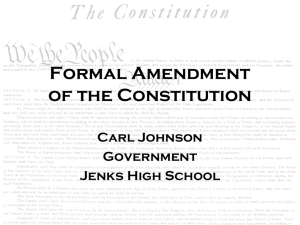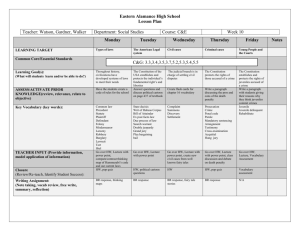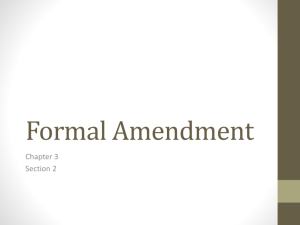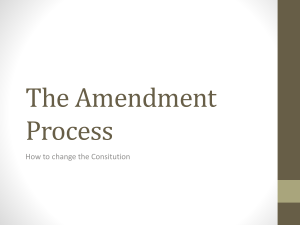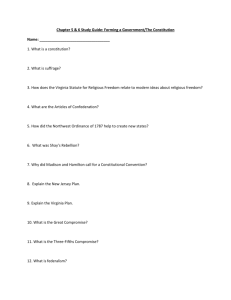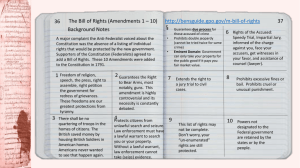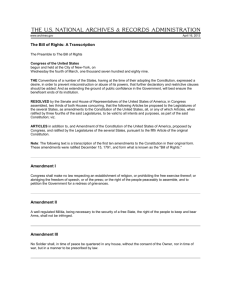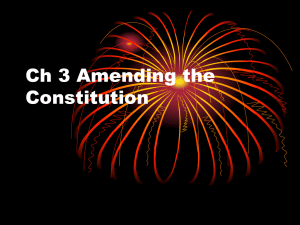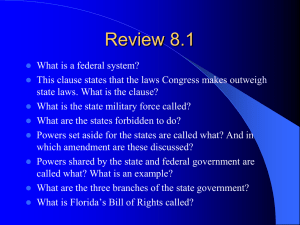Formal Amendment to the Constitution
advertisement
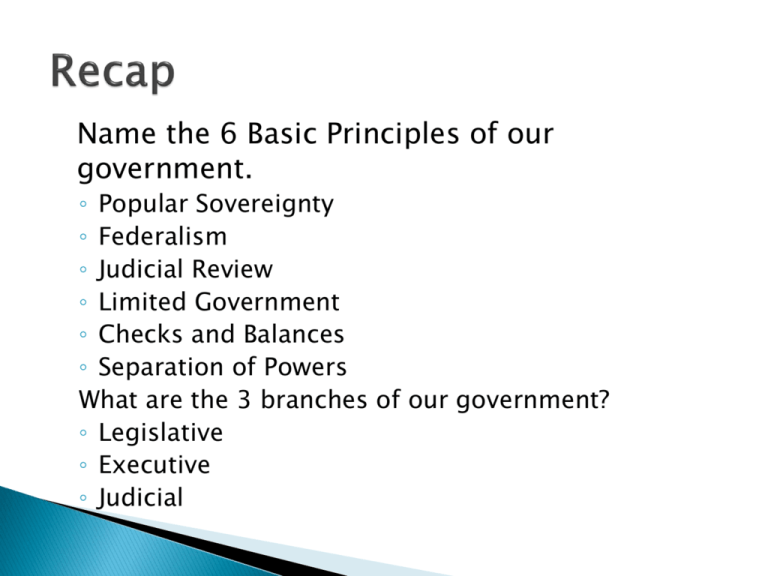
Name the 6 Basic Principles of our government. ◦ Popular Sovereignty ◦ Federalism ◦ Judicial Review ◦ Limited Government ◦ Checks and Balances ◦ Separation of Powers What are the 3 branches of our government? ◦ Legislative ◦ Executive ◦ Judicial Chapter 3, Section 2 May be proposed by a 2/3 vote in each house of Congress and ratified by ¾ of the state legislatures. ◦ 38 of the State legislatures today. Most amendments are added this way. ◦ Why use this method? Decision making stays out of conventions that take a lot of time and money to organize. Proposed by Congress and then ratified by conventions (called for that purpose) in ¾ of the states. Only the 21st Amendment was added this way. ◦ Why use this method? If you want the decision to stay out of the hands of the state legislatures… i.e. taking power away from them. Proposed by a national convention, called by congress at the request of 2/3rds of the state legislatures (34). Must then be ratified by ¾ state legislatures. This has never happened, but could… Why use this method? ◦ If it is an amendment that is more likely to be passed by the American people, not legislatures. Proposed by a national convention and ratified by conventions in ¾ of the States. ◦ The Constitution itself was adopted in much the same way. Why use this method?? ◦ If the amendment is one that national government officials are not likely to acceptsuch as lowering pay for congressmen. “No State, without its Consent, shall be deprived of its equal Suffrage in the Senate.” So, basically anything can be proposed, not many amendments actually get passed, but A LOT get proposed. First 10 Amendments to the Constitution Added because of the demands of the AntiFederalists during the ratification process. Freedom of Religion, Speech, Press, Assembly and Petition. The Right to bear Arms. Quartering of Troops ◦ This amendment was intended to prevent what had been common British practice in the colonial period…making colonists house British troops against their will. No illegal Searches and Seizures ◦ Police have no general right to search whatever they want. ◦ Evidence gained through an illegal search cannot be used in court. Criminal Proceedings, Due Process, Eminent Domain ◦ A person can only be charged for a serious federal crime if they are accused of the crime by a grand jury. ◦ No one can be subjected to Double Jeopardy (being tried for the same crime twice). ◦ Protection against self incrimination. ◦ Eminent domain- the government may take private property for public use if the owner is given a fair price. Criminal Proceedings ◦ If you are accused of a crime, you have the right to be tried in court; in a reasonable amount of time, by a jury. ◦ You also have the right to bring in witnesses, and have an attorney. Civil Trials ◦ Details what a Civil Trial is: Between private parties, or between the government and private parties. A jury is guaranteed in any civil trial where the dollar amount being fought over exceeds $20. Punishment for Crimes ◦ Bail- the money that a person accused of the crime may be required to deposit with the court as a guarantee that he or she will appear in court at the proper time. The amount of bail must be reasonable for the crime that they are being accused. Ex- $2 million bail for shoplifting a video game…not reasonable. Unenumerated Rights ◦ Just because the government sets out specific rights for it’s citizens, that doesn’t mean that they are denied any rights that were not added. Powers States Reserved to the ◦ If the US Constitution does not guarantee a specific right, the states are given permission to grant those rights to their citizens. Added because the Anti-Federalists were strong believers in states’ rights. Come up with a new amendment to the Constitution (in groups of 2-4)- must be appropriate! Write it out as it will be proposed to the government (sounding constitutional). Choose which way you will go about getting it past (which of the 4 methods…think carefully about which one would be the best method). Explain why you chose that method. (A LIST OF THE 27 CURRENT AMENDMENTS ARE ON PAGE 76) Must present to the class. Write each group member’s name on your paper and turn in after presentation.
